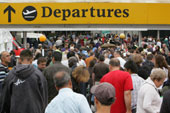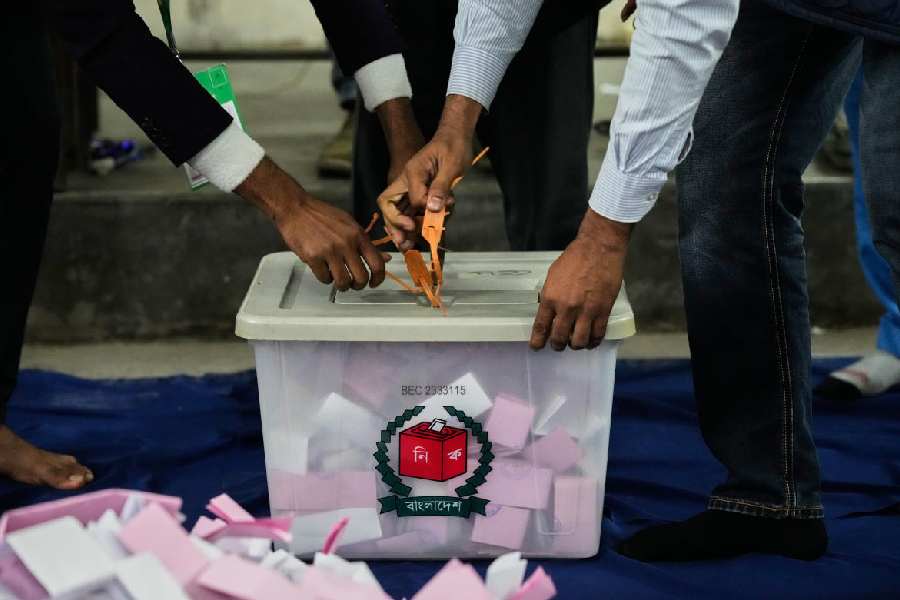 |
Anil Verma is a Calcutta-based travel agent and he is a busy man. With all kinds of queries from his clients — ranging from questions on accommodation in a Srinagar hotel to the cost of a trip to Shimla — Verma’s mobile phone is perpetually ringing.
“Summer is a big headache but at the same time it’s profitable,” he says. But it’s not just tours and travels that is Verma’s source of earnings. By arranging documents and facilitating travel for unskilled labourers emigrating to countries such as Malaysia and Thailand, Verma makes a decent income.
He doesn’t seem bothered by the fact that what he does is illegal as he is not a Recruiting Agent (RA) recognised by the government. “I am doing it on behalf of my clients who are mostly uneducated, and in a way I am helping them,” he reasons.
According to the Emigration Act, 1983, nobody can recruit Indians for employment abroad without obtaining registration from the protector general of emigrants, ministry of overseas Indian affairs (MOIA), that operates through eight field offices of the protectors of emigrants (POEs) located in different parts of the country, including Calcutta. The law applies to anybody who is not a matriculate and wants to migrate to any one of the 17 listed countries (which include most Gulf countries and some southeast Asian nations such as Malaysia and Thailand). Emigration Clearance Required (ECR) is stamped on such passports.
Any Indian who is at least a matriculate is free to travel to any country with a passport and a valid visa. There are around 1,600 RAs in the country and all of them are required to follow the procedures laid down by the government.
Since Verma is not an RA, the modus operandi is different. He operates through “channels”. Verma earns around Rs 90,000 per client. Once a would-be emigrant pays Verma’s fee, his responsibilities end. Agents such as him will have no role to play if emigrants face harassment at the employers’ hands, as it happened with a few labourers from Tamil Nadu in Malaysia recently.
“People who need the emigration clearance are illiterate, and this makes the issue more sensitive as they are the ones who need protection,” says Eduardo Faleiro, Goa’s commissioner for NRI affairs and former minister of state for external affairs. Goa is one of the few states that has an official mechanism to train and track emigrants going abroad.
“The punishments are so minor that agents can afford to take a risk as the potential money that can be earned is huge. The law doesn’t act as a deterrent,” rues Faleiro.
However, changes are now being considered. According to an official in the MOIA, the minimum period of imprisonment for illegal recruitment is likely to be increased from six months to five years and the fine amount may also increase manifold from the current Rs 1,000 when new amendments are introduced.
“Emigration of labourers and trafficking are closely related,” says Justice K. Sukumaran, former justice of Kerala High Court and an advocate in the Supreme Court. He was also the chairman of a committee that submitted a report to the government in 2005, recommending changes to the Emigration Act. “It is my belief that had the government taken heed of the report and brought about the changes, cases of trafficking wouldn’t have happened,” he asserts.
Clearly, an RA’s job is not an easy one. “Because of the paper work and red tape, honest RAs face a lot of problems,” says M.H. Siddqui, proprietor of Delhi-based Al-Hind Foreign Services, which sends around 500 emigrants abroad each year.
According to Siddiqui, spurious agents sometimes take labourers out of India in connivance with airport officials, by getting the ECR clearance without involving the POEs. “Rather than making the provisions tough, they have to simplify the rules, and this would help in curbing illegal emigration,” he says.
According to the MOIA, emigration clearances increased from 2.79 lakh in 2001 to 5.49 lakh in 2005. With the relaxation of rules late last year, when the government decreased the ECR requirement from graduation to matriculation, and also threw open 173 countries for pursuing jobs, emigration is likely to increase. But the law of the land is not strong enough to protect the emigrants.
“The number of emigrants is increasing each year exponentially, and you can imagine how much illegal agents can earn even if they are able to corner a fraction of the total number of Indians going abroad,” says Justice Sukumaran.
Now that the government is readying itself to bring in changes, experts suggest comprehensive amendments. “Our embassies in countries where Indians work should have officials from state cadres. For example, if you have north Indian staff in our embassy in UAE where most emigrants are Keralites, rather than solving the problems, the complications might increase,” says Faleiro. This was one of the suggestions made by the Justice Sukumaran Committee.
RAs are not spared of criticism either. “They may be registered, but what these people do is not always above board as there have been numerous cases when they have charged more than what they should have,” says D. Jayaraj, a legal expert in Justice Sukumaran’s committee.
The guidelines of the ministry clearly prescribe that an emigrant should not pay anything other than the service charge of Rs 2,000 if the person happens to be unskilled. “In fact, what we noticed was that the exploitation started on the Indian soil itself and if this has to stop, RAs should be reined in,” says Jayaraj.
“What the protector general is doing isn’t enough,” says Justice Sukumaran. He suggests that state governments set up state manpower export corporations when outgoing labour from these states is more than the prescribed limit. These corporations could act as guarantors of safe passage to countries.
“The new laws should be specific and strict. That is the crux of the matter,” says Faleiro.











